
INTERNATIONAL PEACE CONFERENCE 2020
In view of the numerous wars and violent conflicts around the world, peace research has been receiving a great deal of importance and attention in recent years. This is because there has been an enormous increase in interest in the determinants of war and violence on the one hand and peace and non-violence on the other. How can wars, conflict escalation and violence be prevented, ended and avoided? And how can peace, constructive conflict transformation and nonviolence be promoted and supported?
Various theoretical, conceptual, and practical approaches are seeking appropriate answers to these questions. One of these approaches was the Peace Conference 2020, which tried to address and answer these very questions.
Insights into the conference (in german)
The Peace Conference 2020 was dedicated to those people and initiatives who actively, courageously, creatively and committedly oppose contexts of violence. They develop and disseminate visions of peace (Thinking Peace), they moderate and shape peace, dialogue and reconciliation processes (Making Peace), as well as design and facilitate peace- and conflict-related educational events and learning processes (Learning Peace) and set targeted peace processes in motion all over the world (Peace Processes Using West Africa as an Example). In this way, they make an important contribution to peaceful coexistence in the One World. These four central aspects, thinking peace, making peace, learning peace and peace processes using the example of West Africa, formed the basic structure of the Peace Conference 2020 in the form of separate thematic blocks.
-
More than 320 participants
-
A total of 30 workshops
-
About 30 countries
-
About 60 speakers
Thinking Peace
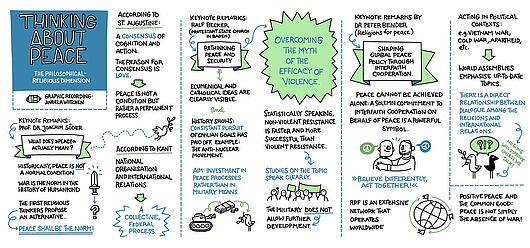
THE PHILOSOPHICAL-RELIGIOUS DIMENSION
Every peace, dialogue and democratization process requires ideas, visions and utopias. Every peace action is based on ethical, religious or spiritual foundations and values. Without the associated thinking about peace, a sustainable peace is inconceivable. In order to overcome the remoteness of peace in our thinking, we need visions of peace and an intensive exchange of ideas and dialogue about them.
Keynote speech 1 (german)
What actually is peace? From the absence of violence to the cooperative process.
- Professor Dr. Joachim Söder
Keynote speech 2 (german)
Rethinking peace and security.
- Ralf Becker
Here you can find the detailed versions of the keynote speeches (german)
Download presentations (german)
Workshops
Karen Hinrichs (Peace Institute EH Freiburg)
The Ecumenical Pilgrimage of Justice and Peace is the common search in a world full of conflicts, injustices and pain, for ways to overcome them. The Ecumenical Pilgrimage of Justice and Peace is a journey with God and passes through the Via Positiva, the Via Negativa and the Via Transformativa. The Via Positiva is the place to celebrate creation and perceive the wonders of the world. The Via Negativa takes us to places of pain, to places where one can feel the wounds of the world. On the Via Transformativa one is transformed; the realization follows: war and peace begin in the mind.
Manuela Vosen
Professor Dr. Joachim Söder (KatHO NRW)
The workshop "Peace as a Cooperative Process" traced the path from Immanuel Kant's philosophical draft "On Perpetual Peace" of 1795 to today's challenges in multilateral cooperation. Prof. Söder explained that, according to Kant, peace on the three levels of domestic organization, intergovernmental relations and cosmopolitan existence cannot be understood as a static state, but can only be created anew as a permanent process of understanding. With the premises of freedom, equality, sovereignty, and freedom of movement, this leads to a federal model of supranational cooperation as realized in the League of Nations and then in the UN. Challenges to the model include low assertiveness vis-à-vis states aiming for dominance rather than understanding and cultural diversity within many contemporary states in contrast to Kant's notion of linguistic-religious unity. Only where these challenges are met through understanding does peace happen.
Burchard Schlömer
Dr. Michael Becker (missio Hamburg)
The starting point for the workshop is the emergence, the context and the most important concepts of liberation theology. It was worked out that liberation theology is a new way of doing theology that emerged at the end of the 60s/beginning of the 70s in the political and social context of Latin America, first in the base communities. An answer had to be found to the question: How to find an appropriate language about God in the midst of suffering and oppression under which the poor have to live? Liberation theology is a critical and systematic reflection on the living experience of God in the world of the poor. This definition says that theology as reflection is always the second step. The first step is the historical practice in the communities. Thus, theology is under the primacy of practice. Important concepts reflected in the workshop are "option for the poor"; the "capitalist market as idol". The peace ethic of liberation theology was elaborated with the help of quotations from Pope Francis' new social encyclical "Fratelli tutti".
Dr. Michael Becker
Professor Maureen Porter (University of Pittsburgh, USA), Professor Dr. Norbert Frieters-Reermann (KatHO NRW)
Human rights are a fundamental component of international law, peacekeeping law and international conflict management. But this is only one perspective. Another perspective focuses on human needs beyond legal frameworks and agreements. From this perspective, it makes sense to analyze violations of basic human needs at various levels, especially in the wake of the current Covid 19 pandemic, from the perspective of basic needs-oriented conflict and violence research. The explicit basic needs orientation (as a complement to the human rights perspective) is an integral part of numerous approaches to international conflict transformation. In particular, Johan Galtung's decades of research and conceptual development are helpful in analyzing violence and conflict dynamics in greater depth. Galtung identifies four basic human needs:
- 1. Survival
- 2. Wellbeing
- 3. Identity
- 4. Freedom
According to Galtung, these four needs are of equal importance and are not subject to any hierarchical order or causal logic.
Prof. Dr. Norbert Frieters-Reermann
Cora Bieß (Berghof Foundation)
The workshop „Interreligious Aspects of Peace Work” was led by Cora Bieß from the Berghof Foundation. The workshop focused on the topic of storytelling with Peace Counts and the project "Peace Education meets Religion" as well as the handbook for multipliers of the same name that was created in the project. Storytelling with Peace Counts has the specific objective of initiating learning processes about peacebuilding, promoting constructive and solution-oriented journalistic reporting, and strengthening networking among peacemakers and their organizations and projects. As an example, Ms. Bieß provided a Peace Counts report from Nigeria. Based on this report, the participants were asked to practice the method of conflict transformation together. Together with Ms. Bieß, the participants discussed the individual sections of conflict ethos, conflict transformation and peace ethos in relation to the report. 18 people participated in the workshop.
Milan Ivić
Making Peace
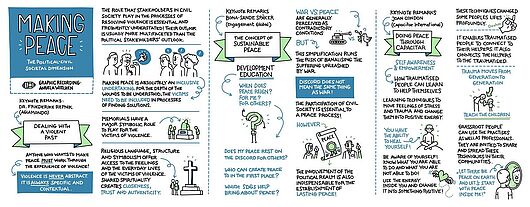
THE POLITICAL-CIVIL SOCIETY DIMENSION
Constructive conflict transformation and peacebuilding is a task for society as a whole and requires concrete peace action at various levels. Over the past decades, numerous civil society approaches to violence prevention and conflict transformation have been tested and further developed worldwide. Their importance for accompanying and shaping peace, dialogue, reconciliation and democratization processes cannot be emphasized clearly enough.
Keynote speech 2 (german)
Dealing with a violent past
— Dr. Friederike Repnik
Here you can find the detailed version of the keynote speech (german)
Workshops
Professor Dr. Ranga Zinyemba (Rector of the Catholic University of Zimbabwe in Harare)
Professor Zinyemba provided an overview of the conflict in Afghanistan with a focus on the recent three peace talks. USA-Taliban Peace Talks, Pakistan-Taliban Peace Talks, Afghanistan-Taliban Peace Talks. Participants from various countries were particularly interested in how other countries in crisis situations (e.g., conflict over state and language borders in Cameroon, Israel-Palestine conflict) can learn from the peace process. Critical questions were raised about whether the West has a genuine interest in a peace process, since arms producers -and traders- profit from violent conflicts. Memorable quote from the chat. "Fratelli Tutti echoes Isaiah 11: 6-9 call for building relationships particularly when the world feels so politically divided. This will help heal the divide."
Dr. Eva Baillie
Dr. Friederike Repnik (AGIAMONDO)
The topics of the workshop were different aspects of reconciliation. Already the origin of the word (Romanic: compensation, Germanic: satisfaction, reparation) shows differences.
Participants shared their understanding of reconciliation and what distinguishes forgiveness from reconciliation.
Different levels of reconciliation are defined by the Colombian Jesuit Mauricio García Durán: reconciliation a) with me, b) with God, c) with others, and d) with creation.
According to the complexity, different focal points are required in post-conflict situations at the places where AGIAMONDO Civil Peace Service specialists are deployed:
- Stabilization of individuals and relationships (e.g. South Sudan)
- Psychosocial support for coping with everyday life (e.g. Liberia)
- Creating meeting spaces (e.g. Sri Lanka)
- Practice of nonviolence, development of values, strengthening of political institutions (e.g. Colombia)
The importance of changing perspectives became clear in an exercise in which participants each took on and expressed a perspective as a victim, a perpetrator or a bystander.
Thomas Hoogen
Bilal Almasri, Iyad Asfour, Kirsten Steinhoff-Fahadi (EIRENE International Christian Peace Service e.V.)
With its project "Strong Neighbors", EIRENE supports refugees and their environment in Germany in dealing with conflicts. In workshops, seminars, public events and training courses, refugees and people from their "neighborhood" learn how to deal with conflicts constructively, thus enabling peaceful coexistence and better integration. The speakers Bilas Almasri, Iyad Asfour and Kirsten Steinhoff- Fahadi from EIRENE, showed in their workshop interactively the methods and exercises they use in their seminars. The educational work is composed of a mixture of exercises on Nonviolent Communication, Intercultural Communication and anti-racist education.
Monika König
Professor Dr. Georg Albers (KatHO NRW)
Probably everyone knows them, moments in which the proverbial "scales fall from the eyes". Situations from the past appear (supposedly) clear and distinct against the background of new knowledge. When it comes to conflict situations, the events are often passed on in such a way that they strengthen one's own position and expose the other side. The larger the conflict, the stronger and more self-referential the narrative.
Since the Euromaidan at the latest, there has been a bitter war in eastern Ukraine between pro-Russian separatists and Ukrainian troops. The war is fueled by the delicate conflict of religious, ethnic, geographical, and historical narratives. But how does one succeed in resolving such "narrative conflicts"? Organizations such as the OSCE rely on dialogue, or more precisely on "narrative dialogue." Here, it is not the conflict as such that is seen as the real problem, but the breakdown of dialogue between the conflict parties. The aim is therefore to bring people from the opposing parties into dialogue with each other, thus opening up a space in which awareness of the position and narratives of the respective opposing party can grow and opposing perspectives are allowed to coexist.
The concept relies on communication, because all human experience is mediated by language, and so are Paths to Peace.
Johannes Duwe
Dr. Cordula Reimann (CORE)
Collective trauma" is understood as a conscious or unconscious identity-forming traumatization of collectives (families, ethnic, social and religious groupings and communities). Dr. Cordula Reimann embedded this important yet often overlooked topic in her workshop, through reference to peacebuilding, within the framework of the peace conference. Indeed, as a different perspective and at the same time an explanation for long-lasting intractable violent conflicts, as well as a more holistic and complete understanding of violent dynamics, the topic of "Collective Trauma" plays a major role. It offers new entry points for peacebuilding and can foster critical reflection on the field. Specifically, this means addressing points such as trauma sensitivity, biographical work in the sense of Don Bar-On ("To Reflect and Trust"), work with body and unconsciousness via sports, art & theater, or even conflict analysis. Dr. Cordula Reimann simultaneously created a theoretical framework to examples of concrete application and defined "Collective Trauma" in terms of "Collective Mind-Sets", "Collective Emotions" and "Collective Narratives". The participants of the workshop were also given the opportunity to openly discuss questions about the forms of collective trauma in our own society, or the approaches and starting points for the transformation of collective or transgenerational transmission of trauma.
Arnd Wiederhold
Lea Scholtes, Moritz Weßer (Pax Christi DV Aachen)
Pax Christi Aachen: Young and peace-minded: International peace services with a future? Under this motto, we discussed challenges and opportunities for voluntary peace services for young adults and also explored answers to the question: How much peace is there in peace services? by means of short interviews with former volunteers.
It became clear to us in this way that the volunteers had intensively engaged with peacebuilding during their service and were able to develop an idea of how they could contribute to peace. At the same time, we realized together that getting to know each other, exchange and reconciliation must not only take place with countries of the global south, but also with our neighboring countries, which we only supposedly know well.
More about the peace services of pax christi and the video sequences with the former volunteers can be found at www.pax-friedensdienste.de
Sr. Ida Haurand
Learning Peace
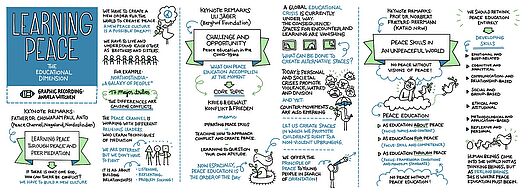
THE EDUCATIONAL DIMENSION
The importance of peace education processes has increased significantly worldwide in recent years. Peace education will increasingly play a key role in preventing, overcoming and following up on violent conflicts. This is because the lifelong development of a comprehensive peace competence is indispensable to enable people to meet the global challenges for peace and security and to promote peace and dialogue processes within society.
Impulsvortrag 3
Ist Friedensbildung in einer Welt organisierter Friedlosigkeit überhaupt möglich? Die Bedeutung von Friedenskompetenzen in einer unfriedlichen Welt.
— Professor Dr. Norbert Frieters-Reermann
Here you can find the detailed version of the keynote speech (german)
Download presentation
Workshops
Father Dr. Chowaram Paul Anto (Peace Channel, Nagaland, Northeast India)
"Peer mediation", an educational tool for conflict resolution, is the central element with which Father Anto in Nagaland (North-East India) tries to resolve conflicts peacefully, especially among schoolchildren and students. To this end, he trains young volunteers who take on the role of mediators. As is usual in mediation, mediation must be between two disputing parties and voluntary, the mediator must be recognized and there must be a will to resolve the conflict. Then both sides are allowed to present their views, a viable solution is sought for both sides, this is recorded in writing and then reviewed again after a reasonable time. In Nagaland, a province in which the conflicts of north-east India are concentrated as if in a burning glass, young people are growing up who are experienced and trained in peaceful conflict resolution and who, in turn, can be multipliers.
Dr. Martin Stauch
Dagmar Nolden, Anne Kruck (Berghof Foundation)
In the workshop, speakers Dagmar Nolden and Anne Kruck will provide insight into the practical approaches of a multi-year peace education project of the Berghof Foundation in Jordan. In the region of the Zaatari refugee camp, the project team developed projects together with the local people with the aim of raising awareness for a peace-promoting civil society. The aim was to anchor the basic values of non-violence, tolerance, mutual respect and participation in the Jordanian education system. Cooperation partners were local leaders, especially teachers from schools, universities and NGOs. The concrete methods and tools of peace work were developed together with them. Intercultural cooperation required a high degree of sensitivity, starting with the translation of the term "peace", which in the context of the local people was understood literally as "pacification/subjugation". Concrete methods of peace work were implemented in workshops with adolescents and young adults, such as theater pedagogical elements and biography work to reflect on patterns of action, role models and social structures. By working with the cooperation partners on an institutional level and integrating the contents into the educational work of schools, universities and NGOs, the peace work can be continued independently on site even after the project has officially ended.
The Berghof Foundation is an independent and non-profit non-governmental organization. It supports conflict parties and other actors in their efforts to achieve political and social change and lasting peace through peacebuilding, peace education and conflict transformation. More information about the project
Magdalena Onyango
Martina Freise (gewaltfrei handeln e. V.)
Martina Freise from gewaltfrei handeln e. V. led the workshop "Listening - communicating empathically". The participants in the workshop dealt, among other things, with self-empathy and empathy for others. At the beginning, the participants were asked to take part in a needs exercise, in order to then discuss what feelings they have when certain needs are met or unmet. After the self-empathy exercise, the focus was on empathy for the other person, i.e. mindful and appreciative listening. In small groups, the participants were asked to tell each other about moments when you were very concerned/satisfied/touched. The subsequent reflection on the exchange served to show the participants that nonviolent communication is an interplay of self-empathy and empathy with others. The freestyle is "I-messages", in which one names one's own feelings & needs as well as (real!) requests and wishes. It is rather to ask questions and try to understand the other person. The workshop was limited to a group size of 15 people.
Milan Ivić
Hubert Heindl (APTE)
Since 2003, 280 participants from 30 African countries have attended the Peace University, 31% of them women. At this annual "summer university" in different countries, active teaching by international trainers takes place during the three-week period in connection with local peace practice. The participants are already involved in peace work and learn here to reflect in depth on their previous experiences, to restructure them and to place them in a deeper, conceptual context. After the end of the course, the Peace University accompanies the TN with one year of coaching in applying what they have learned in their respective institutional context and area of responsibility.
Several international peace awards underline the importance and quality of this project, which is also subsidized by missio.
Contact: apte@apte-net.de
Georg Poddig
Christine Lieser, Claudia Osthues (Forum Ziviler Friedensdienst e. V./forumZFD)
How does peace actually work? This is a central question in ForumZfD's work at schools. But how do you talk about it with children and young people? A theater workshop, a film, e.g. about the Middle East conflict, or a peace walk can be impulses to start a conversation. For what reasons are people forced to leave their homes? How are the causes of flight related to our lifestyle and consumer behavior? What problems do refugees face here in Germany? What is the reality of life like for people in conflict regions? How do people of the same age in conflict regions campaign for a more peaceful coexistence? Dealing with these questions, sooner or later leads to another question: "What can we do for a more peaceful world?"
Manuela Vosen
Peace Processes

EXAMPLE WEST AFRICA
What is peace if it is not real? A look at West Africa in particular shows: Peace does not work without people taking the initiative. In places where people are threatened by terror on a daily basis, peace is a precious commodity. "Boko Haram has widened the rift between Christians and Muslims. But we want to unite Christians, Muslims and people of different tribes and live together in peace" said missio partner Bishop Stephen Mamza. The message from West Africa is more than clear: peace breaks through religious, ethnic and personal boundaries and thus becomes a dialogue of life.
Workshops
Emmanuel Wullingdool, Remy Ullo (CECOTAPS Ghana)
The two speakers presented the work of CETOTAPS in the Upper West Region of Ghana (approx. 700,000 inhabitants). The focus was on the training units for conflict resolution with young people and in the school context, as well as the focus on "leadership training", since poor leadership skills were identified as the greatest threat to peace processes in conflicts over religion, ethnicity and land ownership. For the participants of the digital workshop, it was particularly interesting to learn about the methods of training and the practical implementation of reconciliation policy approaches in a concrete context.
Dr. Eva Baillie
Fr. Isaac Vasumu Augustine (Catholic University of Leuven)
Father Isaac Vasumu Augustine from the Catholic University of Leuven provided deep insights into the multi-religious situation in Nigeria and spoke about religious fanaticism on both the Christian and Muslim sides. Fr. Isaac made it clear that there can be no peace without dialogue between the religions, which must always be an inward appeal to one's own believers. Peacebuilding processes in Nigeria can only be crowned with success if religious actors are involved. The target groups must be reached in various sectors of Nigerian society. The education and community sector, which plays an important role in this territorial state, must be mentioned here, especially in the regions that are reached only inadequately by the central government. One of the most suitable platforms is the Nigerian Inter Religious Council, in which representatives of the major religions meet to discuss Nigeria's national situation from a religious perspective. Peaceful coexistence in Nigeria is highly dependent on religious interaction and understanding.
Philipp Schröder
Marco Moerschbacher (missio Aachen)
The workshop began with a reflection on the ambivalence of religion, which can be both a peacemaker and peacekeeper, as well as a cause of violence. First, the various causes of violence were examined in general terms, whereby political motives, economic interests, ideological factors and external influences can play a role, both individually and in combination. Using the examples of the African countries of Tanzania, Côte d'Ivoire, Chad and Mali, the very different contexts for the relationship between religion and violence, religion, ethnicity and (weak) state, as well as the economic (arable farmers/cattle herders), political (geostrategic interests of France USA, China) and religious-ideological (fundamentalism) contexts were explained. With regard to the peacemaking role of religions, the central importance of interreligious dialogue and its elements (information, sensitization, statements, standards) and the role model function of religious leaders were then pointed out. The need for critical self-examination on the part of the religions and active non-violence as a formative force of conviviality crystallized in this context.
Dr. Michael Becker
Hubert Heindl (APTE)
Doing Peace: Peace activists from 30 African countries mobilize to use their field-tested skills of nonviolence and civil de-escalation to actively accompany local communities in their desire for peace and reconciliation on the ground over a period of several months. The workshop presents the genesis, the concept and the experiences of the INOVAR program, which is supported by the German development agency APTE. Since 2010, the program has been invited by local leaders as a counter-design to obsolete military "peace" missions: Women's and youth groups, priests and imams, mayors and police officers become local peacebuilders via the encouraging presence of the peace teams: empowered to counter the experience of violence with social resilience against destruction, division and revenge. In the open forum of the last half hour, the participants share their experiences of their own peace work and formulate hints and requirements for the further work of the program.
Hubert Heindl
Dr. Christiana Idika (IWM St. Georgen)
"Nigeria na war" is a common Nigerian phrase in everyday English and means something like "Nigeria is at war." Whether with other countries or in the family, whether in the city or in the countryside, every day people in Nigeria have to brace themselves for everyday war-like operations. Sr. Christiana simultaneously described Nigeria's dire situation analytically and emotionally, gripping participants, including a 10th grade class. The approach of the nun and theologian, who holds a doctorate, to overcoming the thoughts of war is a "unlearning", a "de-learning", of war among the youth. This must be followed by a national educational pact of all social groups involved in education. This is what she advocates.
Dr. Martin Stauch
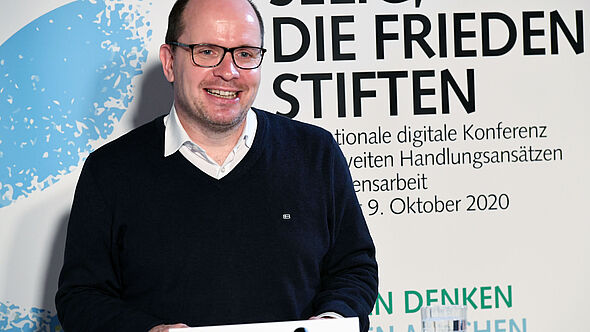
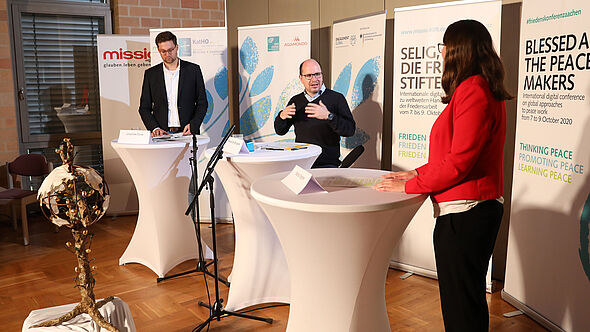
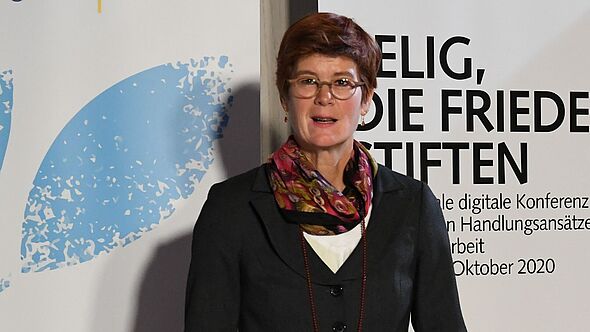
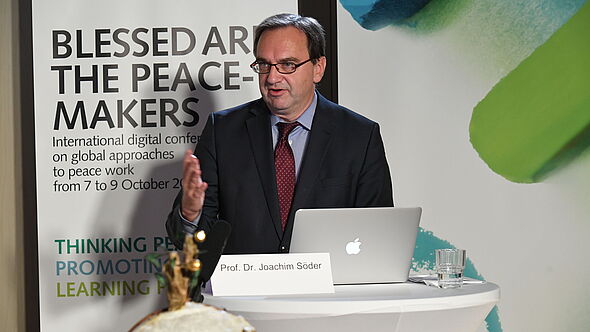
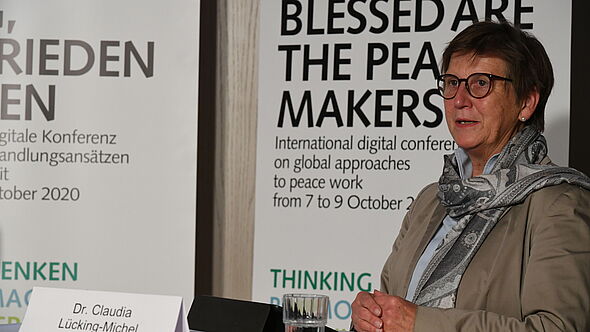
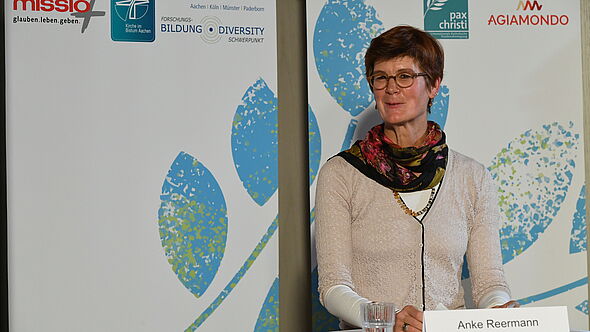
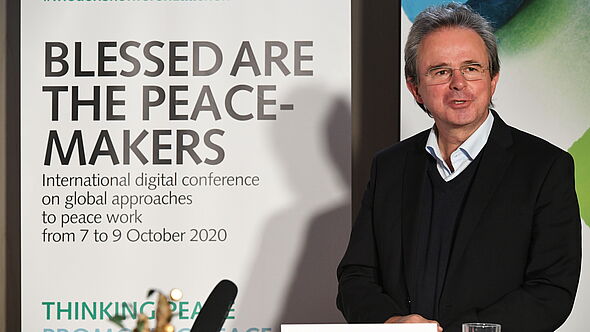
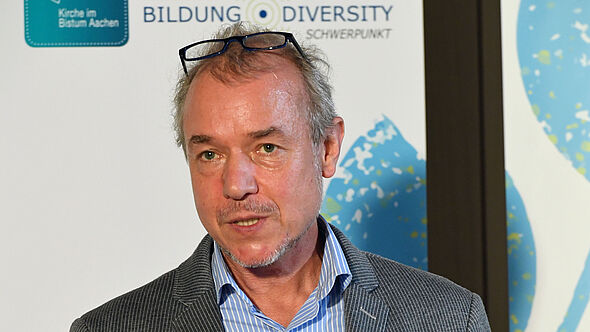
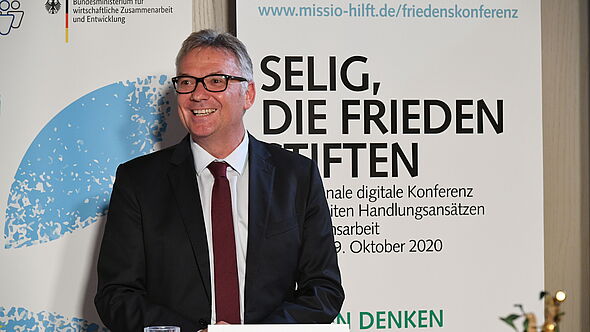
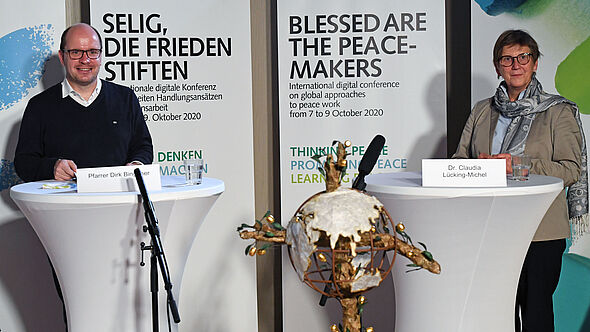
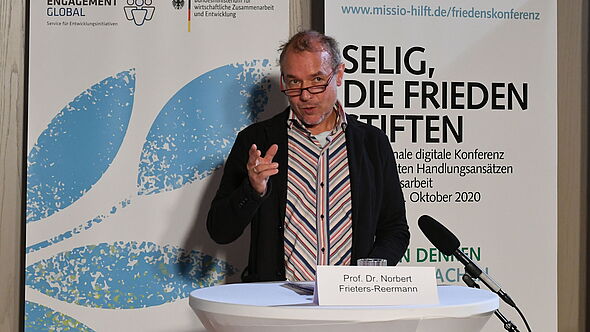

















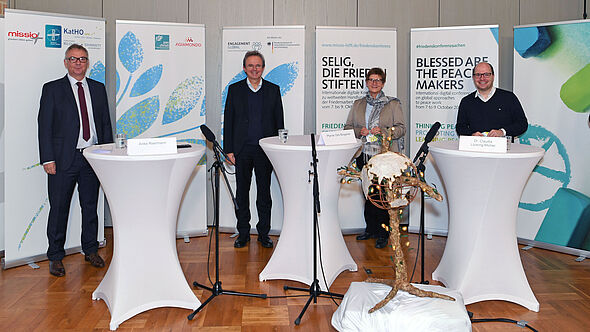
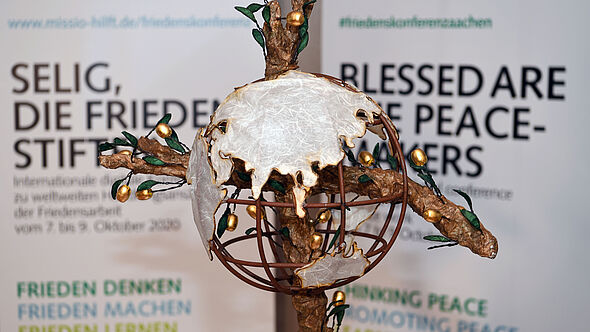
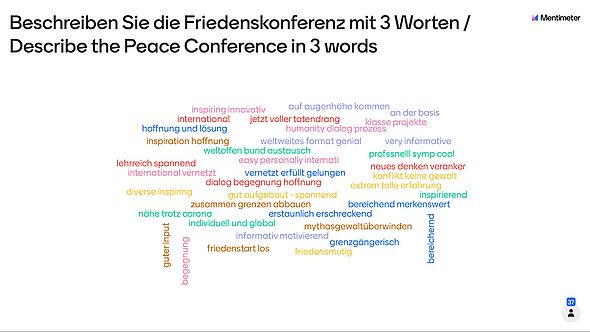
Schreibe einen Kommentar